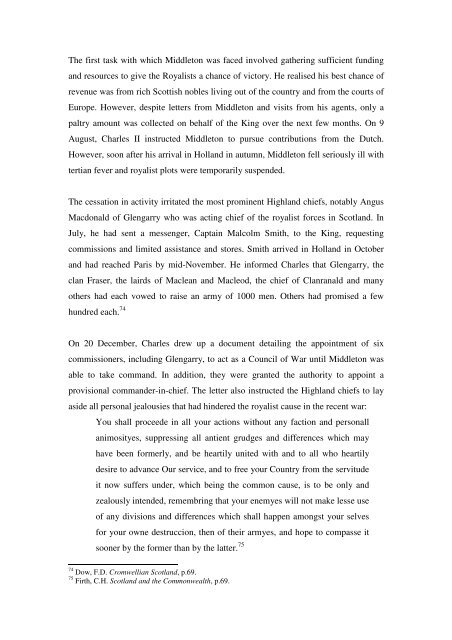The Glencairn Uprising, 1653-54 Helen Baker Department of ...
The Glencairn Uprising, 1653-54 Helen Baker Department of ...
The Glencairn Uprising, 1653-54 Helen Baker Department of ...
You also want an ePaper? Increase the reach of your titles
YUMPU automatically turns print PDFs into web optimized ePapers that Google loves.
<strong>The</strong> first task with which Middleton was faced involved gathering sufficient funding<br />
and resources to give the Royalists a chance <strong>of</strong> victory. He realised his best chance <strong>of</strong><br />
revenue was from rich Scottish nobles living out <strong>of</strong> the country and from the courts <strong>of</strong><br />
Europe. However, despite letters from Middleton and visits from his agents, only a<br />
paltry amount was collected on behalf <strong>of</strong> the King over the next few months. On 9<br />
August, Charles II instructed Middleton to pursue contributions from the Dutch.<br />
However, soon after his arrival in Holland in autumn, Middleton fell seriously ill with<br />
tertian fever and royalist plots were temporarily suspended.<br />
<strong>The</strong> cessation in activity irritated the most prominent Highland chiefs, notably Angus<br />
Macdonald <strong>of</strong> Glengarry who was acting chief <strong>of</strong> the royalist forces in Scotland. In<br />
July, he had sent a messenger, Captain Malcolm Smith, to the King, requesting<br />
commissions and limited assistance and stores. Smith arrived in Holland in October<br />
and had reached Paris by mid-November. He informed Charles that Glengarry, the<br />
clan Fraser, the lairds <strong>of</strong> Maclean and Macleod, the chief <strong>of</strong> Clanranald and many<br />
others had each vowed to raise an army <strong>of</strong> 1000 men. Others had promised a few<br />
hundred each. 74<br />
On 20 December, Charles drew up a document detailing the appointment <strong>of</strong> six<br />
commissioners, including Glengarry, to act as a Council <strong>of</strong> War until Middleton was<br />
able to take command. In addition, they were granted the authority to appoint a<br />
provisional commander-in-chief. <strong>The</strong> letter also instructed the Highland chiefs to lay<br />
aside all personal jealousies that had hindered the royalist cause in the recent war:<br />
You shall proceede in all your actions without any faction and personall<br />
animosityes, suppressing all antient grudges and differences which may<br />
have been formerly, and be heartily united with and to all who heartily<br />
desire to advance Our service, and to free your Country from the servitude<br />
it now suffers under, which being the common cause, is to be only and<br />
zealously intended, remembring that your enemyes will not make lesse use<br />
<strong>of</strong> any divisions and differences which shall happen amongst your selves<br />
for your owne destruccion, then <strong>of</strong> their armyes, and hope to compasse it<br />
sooner by the former than by the latter. 75<br />
74 Dow, F.D. Cromwellian Scotland, p.69.<br />
75 Firth, C.H. Scotland and the Commonwealth, p.69.
















